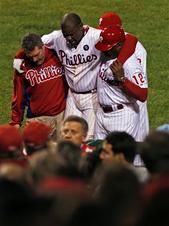One run… that’s what most people seem to want to talk about. One run. Why can’t a team that wins 102 games score one run in a game that determines their fate more than any of the 166 games played before it? Then, after a brief discussion of one run, most people turn the conversation to one player. Why is Ryan Howard making so much money when he can’t come up with one clutch hit in a postseason? Then, after placing the target squarely on the bat of Ryan Howard, most people put Charlie Manuel on the dartboard. Then Chase Utley, then Polanco, then… well, you get the picture. All the conversation leads back to one belief that most Phillies fans held firmly in grasp all the way up through the ninth inning last Friday night – “the Phillies have to win the World Series or they have failed. This team may not have any other fate.”
What people must remember, however, is that baseball (probably more than any other sport) never has and never will have any guarantees. For all its glory and grandeur, it can also be as unpredictable and unkind as any game in the world, and anyone who believes a baseball team is destined to win a world championship will quickly find out that destiny is rarely invited to the party that takes place in baseball stadiums in October.
Since baseball is a game of statistics, let’s examine a few numbers.
- Only twice in the last 30 years have teams won consecutive world championships.
- The Chicago Cubs and the Seattle Mariners hold the record for the most wins in a regular season at 116. Neither team won a world championship in the year they hit that mark.
- The Atlanta Braves won 14 consecutive division titles from 1991-2005; in that span, they won just one World Championship and only advanced to the World Series four times.
The common theme: the regular season is simply no predictor of the World Champion.
Over 162 games, a baseball team that has four starting pitchers (and at times five) who could be the ace of almost any MLB staff is going to win a lot of games. Such a factor is exactly why the Phillies held baseball’s best record this season, and the same factor is at the heart of the Braves holding the best mark in their division for nearly a decade and a half consecutively. However, over a short span of five or seven games, the names on the roster and the depth in the rotation take a distant back seat to factors such as momentum, luck, and timing.
Ryan Howard, Philadelphia’s most recent scapegoat (causing fans to forget about Andy Reid for about 48 hours) has, in the last six seasons, compiled at least 529 AB each year, has hit over 30 HR and driven in at least 108 runs in each season, has three times led the league in RBI, and twice led the league in HR. He has accounted for 1,479 runs through RS and RBI over his career, equating to about 1.46 runs per game. In comparison, Babe Ruth’s RS and RBI accounted for 1.75 runs per game through his career, a differential of only .29 runs per game. Additionally, Howard has been about as classy and productive in the community as any Philadelphia athlete, and yet despite his athletic and human contributions to this city he is, because of his inability to score one run in one game, the latest target of the baseball fans who expect automatics and instant gratification in a game that rarely contains either.
Every team that earns a birth in the postseason has won enough games in the regular season to finish at the top. No team can win that many games over a summer without quality starting pitching. So, when teams square off in the postseason, they generally all have at least three starting pitchers that can beat any team on any night. The 2011 regular season Phillies were a pitching and defense strong team with an inconsistent offense. The 2011 postseason Phillies were the exact same thing, but they only played five games, and all five were against another team with at least three starting pitchers that could win on any given night. If Ryan Howard, or Chase Utley, or Placido Polanco was not able to produce offensively over these five games, perhaps it was merely because they were in the postseason, exactly what they were in the regular season. Take any block of five games against some of the best opposing pitching in baseball during the regular season and the offensive results would likely have been the same. And if that’s too much researching and calculating, rest on this reality – baseball is simply unpredictable. An underdog can always win, a favorite can always lose, a star can always hit a slump, and a no name or a has-been can always be a hero. That’s why baseball is so uniquely American.
Fans should take solace in remembering that we are lucky to have what we have for six months and 162 games. After that it is a simple equation – sometimes they’ll hit, sometimes they won’t, and sometimes they win and sometimes they don’t. That’s baseball. Many things have to go right for Ryan Howard’s run production that wins the marathon of the season, to be enough to win the sprint of a postseason series. And much must fall into place for a team to win 11 postseason games. So though the sting of the Cardinals’ one run on Friday night may still exist, remember that the only right we should have had as baseball fans was that we had no right to expect anything.
** All statistics courtesy of baseball-reference.com


